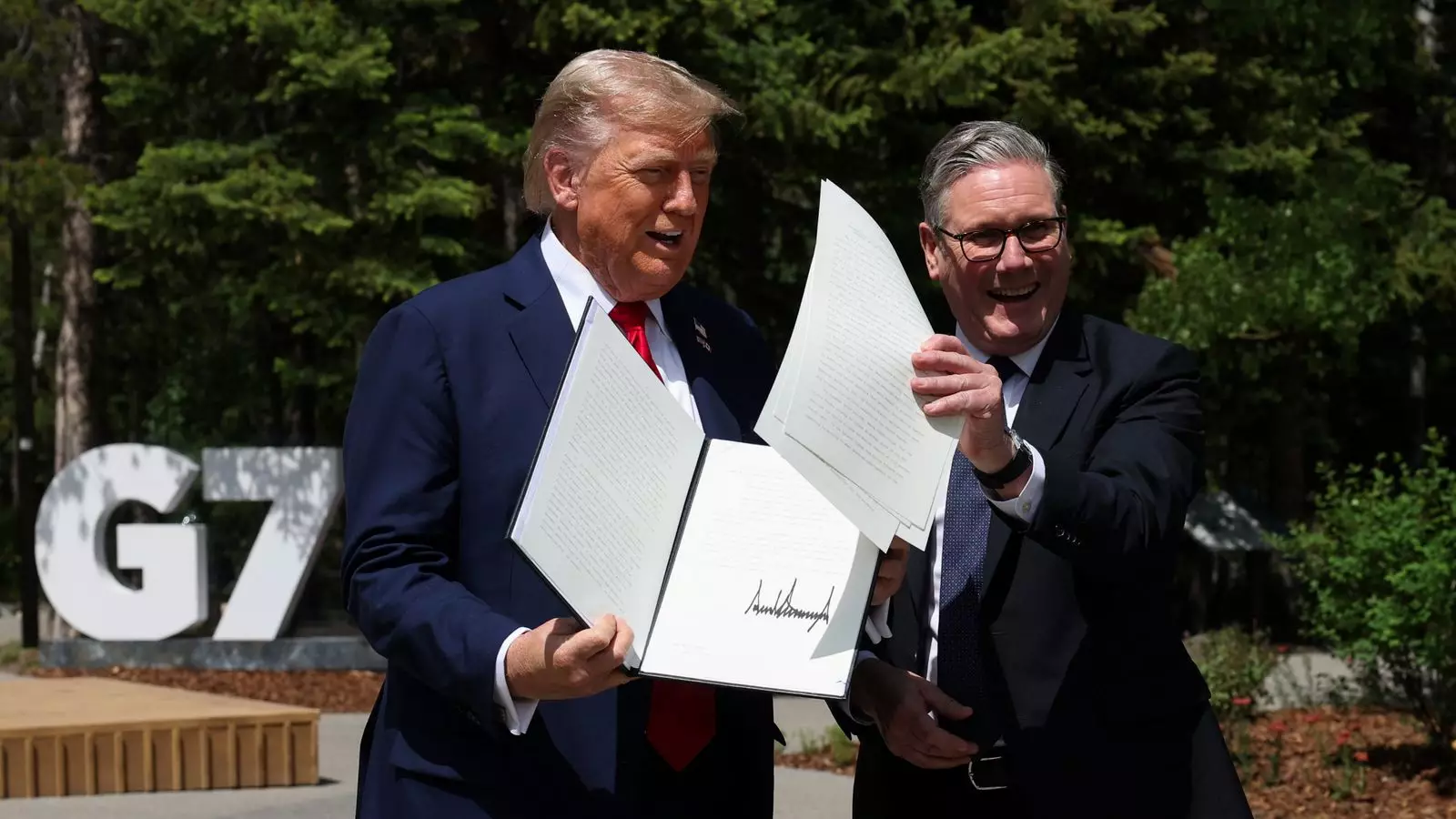The recent announcement of a signed trade deal between the UK and US by President Donald Trump has been cloaked in a ceremonial glow, suggesting a triumph that both leaders are eager to portray. Afraid of losing momentum on the global stage, Trump’s declarations at the G7 summit reflect both a moment of political theater and underlying complexities that cannot be ignored. It is easy to succumb to the allure of promises, yet the reality may not be as rosy as it’s painted.
While Trump waxes lyrical about a “fair deal” that will generate jobs and income, it merits scrutiny. Often, the triumphs claimed within the glassy halls of international summits mask layers of economic realities that don’t always translate into tangible outcomes for ordinary citizens. The claim of job creation and new industries flourishing under this agreement is déjà vu to those who remember similar rhetoric during Trump’s previous trade discussions, which ultimately led to more strife than success for many sectors.
A Vulnerable Trade Landscape
The details of the deal are scant, and ambiguity looms large over issues such as future tariffs on British steel exports. Trump’s offhand remarks about the levels of tariffs demonstrate a cavalier attitude towards serious economic ramifications that can devastate communities reliant on industries threatened by sudden trade shifts. Just how “well protected” the UK is against tariffs remains open for interpretation, especially when historical precedences show that such assurances can dissolve easily like sugar in water.
While Sir Keir Starmer, the UK Prime Minister, hailed the trade deal as an instance of mutual strength, one cannot overlook the precarious position it puts Britain in, particularly in the face of sluggish economic recovery following the pandemic and the lingering impacts of Brexit. The need for sound economic policies should not be swapped for the thrill of striking deals that may sound good in the short term but crumble when weighed against long-term economic realities.
The Illusion of Partnership
The camaraderie displayed by Trump and Starmer, replete with compliments on leadership and alliances, surfaces as a troubling undercurrent. When Trump acknowledges Sir Keir as “slightly more liberal,” it raises eyebrows about the inherent relationship between ideology and policy formulation in this new pact. What does it mean to establish an agreement with a leader who represents a branch of liberalism that is often at odds with conservative economic objectives? This partnership runs the risk of becoming an elaborate façade rather than a true representation of shared values.
Additionally, the jovial exchange between the two leaders distracts from the contentious issues that remain unaddressed. On the surface, the symbolic act of holding up a physical document represents triumph; however, the fact that papers fell from the binding encapsulates the chaos lurking beneath. Instead of solidifying a partnership, it may highlight how the flimsy nature of this agreement could easily unravel.
The Critics Whisper on Economic Impacts
Behind the uplifting tones of both leaders lies a chorus of economists and industry experts who grow increasingly wary of what this trade deal could mean for vital sectors across the UK. Tariffs, quotas, and trade restrictions can dramatically affect local businesses and consumers alike. Are we witnessing a pivot towards proactively embracing trade wars under the guise of liberation? Or are we looking at a superficial agreement designed to cater to political aspirations rather than substantive economic benefit?
The agreement has the potential to exacerbate inequalities and cement a divide between those who reap the benefits of trade and those left behind. The long-term repercussions are yet to be envisaged, but history demonstrates that when economic interests are propped upon political whims, the aftermath can be disastrous, leading to stunted growth and increased disillusionment among the populace.
At its core, the UK-US trade deal is more than numbers on a page; it’s about people’s lives, jobs, and futures. While the celebratory rhetoric may camouflage the concerns, it heightens the urgency for transparency and accountability. The potential consequences could ripple far beyond the boardrooms of power, reaching deep into the everyday lives of citizens grappling with the fallout from ambitious deals that promise much but may deliver little.

